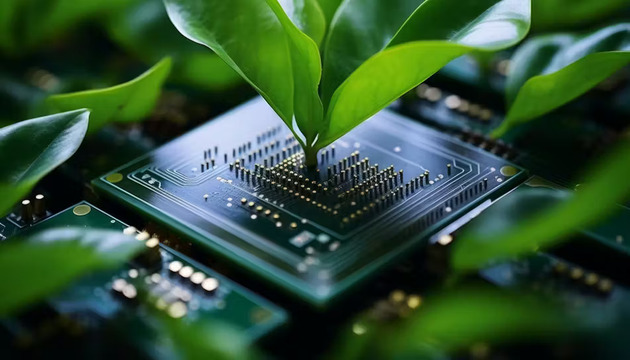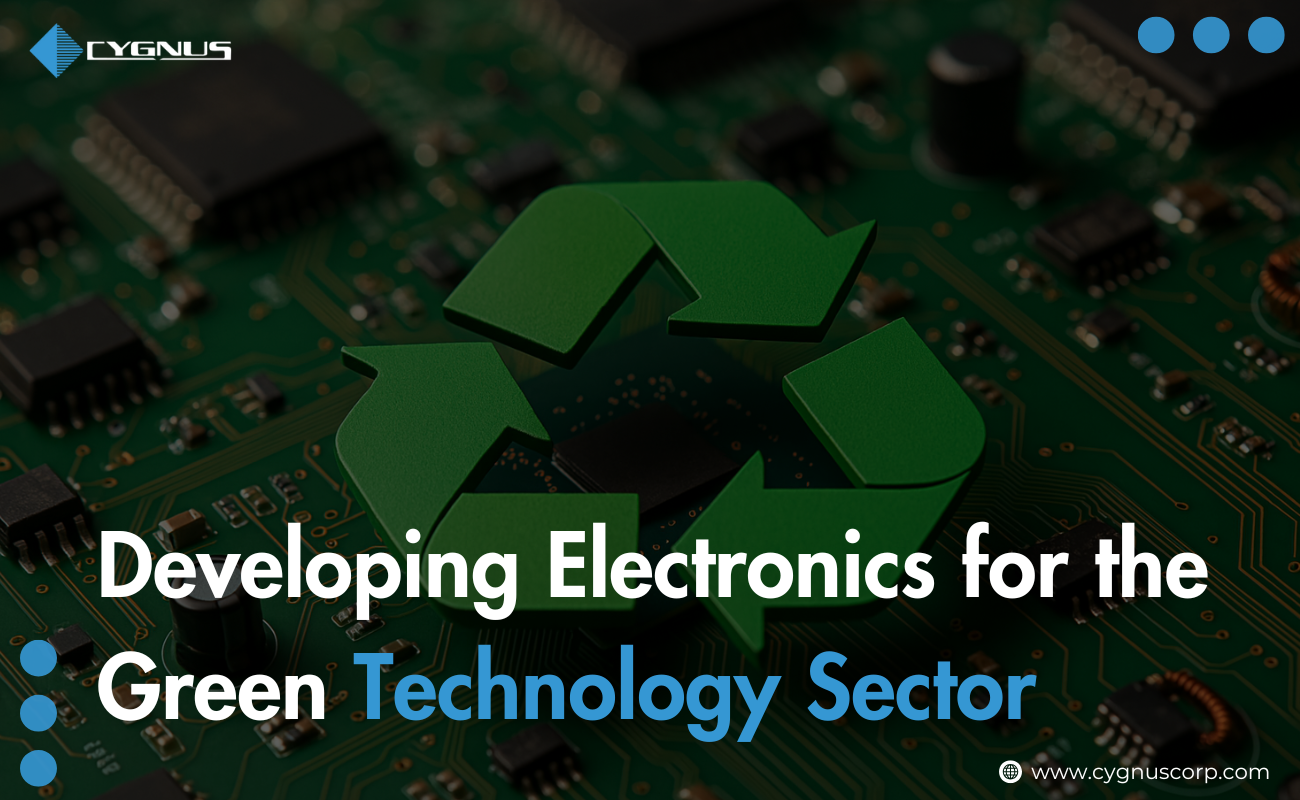The push for sustainability has never been stronger, and electronics are right at the heart of this green revolution. From solar panels to smart energy systems, green technology is reshaping how we power our lives. But behind every efficient solar inverter or EV charger is a robust electronics manufacturing process. In this blog, we’ll explore how electronics are powering green tech innovations and why companies like Cygnus Electronics are crucial to this transformation.
What is Green Technology?
Green technology also known as clean tech or environmental tech—refers to innovations and systems designed to reduce environmental impact and promote sustainability. These technologies aim to conserve natural resources, reduce carbon emissions, and foster a more energy-efficient future. From solar panels and wind turbines to electric vehicles and energy storage systems, green technology spans a wide range of industries and applications.
At the core of these innovations lies a vital foundation: electronics for green technology. Without advanced electronics, green solutions simply can’t function efficiently. Whether it’s the circuit boards in a solar inverter or the sensors in an EV battery system, electronics are what make green technology smart, connected, and scalable.
That’s where Developing Electronics for the Green Technology Sector becomes crucial. Modern electronics must not only be high-performing but also built with sustainability in mind. This means using eco-friendly materials, optimizing energy consumption, and minimizing waste throughout the production process—an approach known as sustainable electronics manufacturing.
To meet the growing demand for clean energy solutions, companies are turning to EMS for renewable energy—Electronic Manufacturing Services that specialize in producing reliable, high-precision components tailored for solar, wind, EV, and other green tech applications. These partners bring technical expertise, scalable production, and a deep understanding of regulatory and environmental standards—making them a key player in the global green movement.
Key Applications of Electronics in the Green Tech Sector:
Electronics are the hidden heroes behind every green innovation. From capturing clean energy to storing and managing it efficiently, electronic components for green tech are essential across various sustainable technologies. Here’s a closer look at where these electronics make the biggest impact:
Solar Power Systems:
Solar power systems rely heavily on efficient electronics to convert sunlight into usable energy. Inverters, charge controllers, and real-time monitoring systems require advanced PCB design for solar projects to ensure performance and durability. As demand grows, EMS for renewable energy providers play a crucial role in delivering scalable, cost-effective components that meet both technical and environmental standards.
Electric Vehicles (EVs):
EVs are packed with complex electronics—from Battery Management Systems (BMS) to motor controllers and charging infrastructure. These systems must be lightweight, efficient, and resilient. Developing Electronics for the Green Technology Sector means crafting components that balance performance with sustainability, while also supporting innovation in mobility.

Wind Energy:
In wind turbines, electronics handle power conversion, system controls, and condition monitoring. These components must withstand harsh outdoor conditions and operate reliably over time. Sustainable electronics manufacturing ensures that these systems are produced using materials and methods that reduce environmental impact while maintaining high efficiency.
Smart Grids and IoT:
Smart grids use IoT-enabled electronics to optimize energy distribution and consumption. Sensors, controllers, and communication modules are central to monitoring real-time usage and integrating renewable sources. Electronics for green technology in this space enable smarter homes, responsive power systems, and efficient energy flows—all backed by robust, reliable EMS partnerships.
How Electronics Manufacturers Support Green Innovation?
Behind every solar panel, wind turbine, and electric vehicle is a network of advanced electronics, crafted by manufacturers committed to sustainability and innovation. At the forefront of this effort is Cygnus Electronics, a trusted EMS partner known for delivering reliable, scalable solutions to the green tech sector.
Cygnus plays a key role in developing electronic components for green tech by offering end-to-end support, from concept to production. Their expertise in PCB design for solar projects ensures that every circuit board is optimized for energy efficiency, durability, and long-term performance.
With growing demand for clean energy, Cygnus provides customized green energy electronics solutions tailored for solar power systems, EV charging stations, and renewable energy storage. Their team works closely with clients to ensure compliance, precision, and reliability at every step.
But what truly sets Cygnus apart is their commitment to eco-friendly PCB manufacturing. By using RoHS-compliant materials, minimizing waste, and adopting efficient production practices, they reduce environmental impact without compromising on quality.
As a trusted provider of EMS for renewable energy, Cygnus helps green tech innovators bring sustainable ideas to life, faster, smarter, and greener.
Sustainable Practices in Electronics Manufacturing:
Modern electronics manufacturing is evolving to support environmental responsibility. Here are some key sustainable practices adopted by forward-thinking EMS providers like Cygnus:
- ✅ Use of RoHS-Compliant Materials
Ensures electronic components are free from hazardous substances like lead and mercury. - 🔁 Waste Reduction and Recycling
Scrap materials, packaging, and production waste are minimized or reused whenever possible. - ⚡ Energy-Efficient Production Processes
Machinery and systems are optimized to consume less power during assembly and testing. - 🌱 Eco-Friendly PCB Manufacturing
Water-based cleaning methods and lead-free soldering reduce environmental footprint. - 📦 Sustainable Packaging
Recyclable and biodegradable packaging materials are used to lower plastic waste. - 🔧 Lifecycle Planning and Durability
Electronics are designed for longevity and ease of disassembly to support future recycling or reuse.
The Future of Electronics in Green Technology:
As innovation accelerates, the future of electronics for green technology lies in smarter, more efficient, and sustainable systems. From AI-powered energy optimization to biodegradable circuit materials, the possibilities are expanding rapidly. With growing emphasis on sustainable electronics manufacturing, manufacturers are rethinking every aspect—from design to disposal—to reduce environmental impact. This shift not only supports eco-conscious goals but also strengthens the foundation for Developing Electronics for the Green Technology Sector that are built to last, adapt, and lead the way in the clean energy revolution.
Why Work with a Specialized EMS Partner Like Cygnus?
Choosing an experienced partner like Cygnus Electronics means gaining access to industry-specific knowledge, agile prototyping, and high-quality production. As a trusted provider of EMS for renewable energy, Cygnus delivers tailored solutions for solar, EV, and smart energy systems. Their deep expertise in sustainable electronics manufacturing and proven track record in producing critical electronic components for green tech makes them a strategic ally for companies looking to innovate responsibly and scale efficiently in the green tech space.
Conclusion:
As the world shifts toward cleaner, smarter technologies, the role of electronics in building a sustainable future has never been more vital. Developing Electronics for the Green Technology Sector requires a careful balance of innovation, performance, and environmental responsibility. From solar and EV systems to smart grids, electronics for green technology are the backbone of this transformation.
Partnering with experts like Cygnus ensures access to advanced green energy electronics solutions that are built to last—and built responsibly. With a strong focus on eco-friendly PCB manufacturing, Cygnus helps turn sustainable ideas into high-impact products that truly make a difference.
FAQs:
What type of electronics are used in solar power systems?
Electronics in solar systems include inverters, microcontrollers, power optimizers, and PCBs that manage energy flow and system efficiency.
How does electronics manufacturing contribute to sustainability?
Sustainable EMS practices involve using eco-friendly materials, reducing production waste, and ensuring energy-efficient processes during assembly and testing.
Can electronic components be customized for green tech projects?
Absolutely. EMS providers like Cygnus offer custom PCB design, prototyping, and turnkey manufacturing tailored for solar, EV, and energy storage technologies.
What makes electronics manufacturing for green tech different from traditional sectors?
Green tech electronics demand higher energy efficiency, durability in diverse environments, and compliance with environmental standards like RoHS.





2 Comments
Bonus Pendaftaran di Binance
Your article helped me a lot, is there any more related content? Thanks!
创建Binance账户
Can you be more specific about the content of your article? After reading it, I still have some doubts. Hope you can help me.